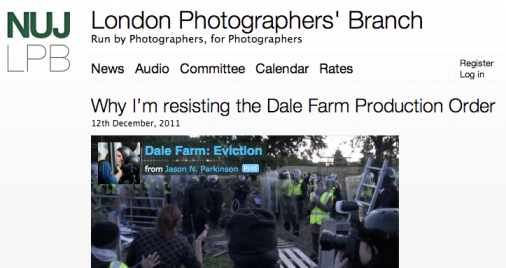
Here’s a legal issue which is not covered in the Online Journalism Handbook but which looks likely to become an increasing issue for online journalists filming video of events such as riots, protests and evictions: the Production Order.
Jason Parkinson writes on the NUJ’s London Photographers’ Branch blog about his fight to oppose a production order application to seize all his video footage of the Dale Farm eviction:
“The production order, calling for all footage shot on 19 and 20 October, is also being served upon other news outlets.
“I am resisting the order with the full support on the National Union of Journalists (NUJ) and legal support from Bindmans Solicitors. The handing over of material, either published or unpublished goes against the NUJ Code of Conduct.
“I strongly believe a journalist should protect her/his confidential sources and material gathered in the course of her/his work. If I am forced to comply with the production order I am being forced into breaching my own union’s ethical code, but also to be forced into being an unwilling agent of the state, handing over material that will surely be used as intelligence.”
Foot Anstey provide a useful guide to production orders as they apply to the media, exploring rules set out in the Police and Criminal Evidence Act 1984 (PACE). These include a distinction between “excluded material” and “special procedure material”. Emphases are mine:
“Police seeking access … must make an application to a circuit judge, giving prior notice to the relevant journalist or media organisation.
“”Excluded material” is defined to include journalistic material which consists of “documents” or other “records” acquired or created for the purposes of journalism and which a person holds in confidence – for example, subject to the obligation under clause 14 of the PCC’s Code to protect confidential sources of information.
“… “Special procedure material” means material which has been acquired or created for the purposes of journalism and which does not fall within the definition of “excluded material”.”
In other words, the difference seems to lie in the confidentiality of the material.
These definitions then shape the case that the police must make. For “excluded material” they need to effectively make the same case as they would for a search warrant, and that such a warrant “could lawfully have been authorised under another statute (e.g. under the Theft Act)”. More on search warrants here.
This sort of case can also be made for “special procedure material”, but that category also allows the police to make other arguments, which I’ve split into bullet points with emphasis added:
- “That there are reasonable grounds for believing an indictable offence has been committed;
- “That there is special procedure material on specified premises;
- “That the material is likely to be of substantial value to the relevant police investigation;
- “That it is likely to be relevant evidence;
- “That other methods of obtaining it have been tried without success, or have not been tried because it appeared they were bound to fail;
- “and that it is in the public interest, having regard to the benefit likely to accrue to the investigation and to the circumstances in which the person holds the material, that the material should be produced or that access be given to it.”
Failure to comply with a production order “may be dealt with as a contempt of the Crown Court.” Contempt is an offence punishable by imprisonment.
It’s notable that the legal language specifies material “acquired or created for the purposes of journalism” – so the focus is not on the person’s occupational role (i.e. journalist) but rather the purposes of the material, which would suggest that bloggers, for example, would still come under the same process.
Despite that language, what’s not clear is if a person filming an event for their own personal blog or an independent niche or hyperlocal blog would be issued with a production order, or if police would resort to other procedures.
If you are, or know of, a blogger who has been the subject of a police request for material, it would be very useful to know how that request was made – and how you dealt with it.
